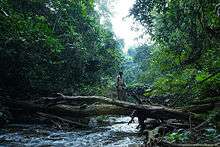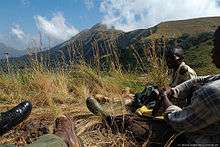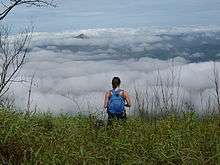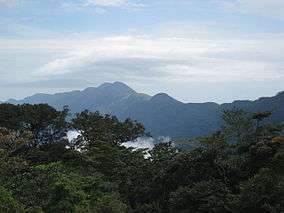Mount Nimba Strict Nature Reserve
| Mount Nimba Strict Nature Reserve | |
|---|---|
|
Mount Nimba landscape | |
| Nearest city | Yekepa, Bossou, N'Zoo |
| Area | 17,540 hectares |
| Type | Natural |
| Criteria | ix, x |
| Designated | 1981 (5th session) |
| Reference no. | 155 |
| State Party | Guinea and Côte d'Ivoire |
| Region | Africa |
Mount Nimba Strict Nature Reserve is a protected area and UNESCO World Heritage Site in both Guinea and Côte d'Ivoire, extending over a total of area of 17,540 ha, with 12,540 ha in Guinea and 5,000 ha in Côte d'Ivoire. The reserve covers significant portions of Nimba Range, a geographically unique area with unusually rich flora and fauna, including single-site endemic species such as viviparous toads. The highest peak is Mount Richard-Molard at 1,752 m (5,750 ft).
History
The strict nature reserve was established in 1943 by Order No. 4190 SE/F in Côte d'Ivoire and in 1944 by decree in Guinea. The Guinean part was accepted as a biosphere reserve in 1980. Both reserves combined form one World Heritage site since 1981 (Guinea) and 1982 (Côte d'Ivoire).[1] Mount Nimba serves is an important refugium for numerous Western African species.
The nearest major settlements are the town Yekepa to the west in Liberia, Bossou and N'Zoo in Guinea.
There is a local conservation and management center planned by Guinean Park Foundation.
Geography
Nimba range is a 40 km-long narrow ridge running southwest to northeast, part of a Guinean backbone. It has great topographical diversity with valleys, plateaux, rounded hilltops, rocky peaks, abrupt cliffs, waterfalls, and bare granite blocks. Nimba range, including the strict nature reserve is an important water tower with about fifty springs between Guinea and Côte d'Ivoire. Mount Richard-Molard is the highest peak at 1,752 m (5,750 ft), which is the second highest point in West Africa, west of Cameroon.[2]
Climate

Mount Nimba Strict Nature Reserve has a sub-equatorial montane climate subject of influences.[2] Temperatures changes extremely by elevation, with daytime maximum ranging between 24oC and 33oC, while nightly minimum temperatures can fall below 10oC in the highest peaks. There is significant variation in the rainfall on different sides of the reserve. Most rain falls on the southern slopes, however northern slopes there are little rainfall from the Atlantic due to rain-shadow effects. In addition these leeward slopes are also subject to the dry Harmattan winds blowing from the Sahara Desert, giving rise to xeric conditions.[3]
Ecology


Mount Nimba Strict Nature Reserve lies within Guinean Forests of West Africa biodiversity hotspot. It harbour an especially rich flora and fauna, it is the home of more than 2000 vascular plants, 317 vertebrate species, 107 of which are mammals, and, to more than 2,500 invertebrate species with a strong endemism level. Notably endemic vertebrates such as the Micropotamogale of Mount Nimba (Micropotamogale lamottei), the viviparous toad of Mount Nimba (Nimbaphrynoides occidentalis), and Lamotte's roundleaf bat (Hipposideros lamottei). Other threatened animals are West African lion (Panthera leo senegalensis), pygmy hippopotamus (Choeropsis liberiensis), zebra duiker (Cephalophus zebra), and western chimpanzees that use stones as tools.[1]
Terrestrial ecoregions including Guinean montane forest, Western Guinean lowland forest, and Guinean forest-savanna mosaic. Nimba Range has a distinct freshwater ecoregion, because of high portion of endemic aquatic species.
Trivia
One of the four honey buzzards of Kempen-Broek that are equipped with GPS trackers passed this national park on 13 November 2013.[4]
See also
References
- 1 2 http://whc.unesco.org/fr/list/155
- 1 2 "Mount Nimba Strict Nature Reserve, Guinea and Côte d'Ivoire". www.eoearth.org. Retrieved 2016-02-26.
- ↑ "West Africa: Scattered across Guinea, Ivory Coast, | Ecoregions | WWF". World Wildlife Fund. Retrieved 2016-02-26.
- ↑ "Wespendieven van het Kempenbroek".
External links
- UNESCO Mount Nimba Strict Nature Reserve Site
- Mount Nimba Strict Nature Reserve, Guinea and Côte d'Ivoire (UNESCO MAB Biosphere Reserves Directory)
- Mount Nimba Strict Nature Reserve, Guinea and Côte d'Ivoire (African World Heritage Sites)
- Mount Nimba Strict Nature Reserve, Guinea and Côte d'Ivoire (Encyclopedia of Earth)
- Mount Nimba (Freshwater Ecoregions of the World)
- APES MAPPER
- WCMC Natural Site Data Sheet
- Act Establishing East Nimba Nature Reserve - Republic of Liberia
Coordinates: 7°36′11″N 8°23′28″W / 7.603°N 8.391°W
